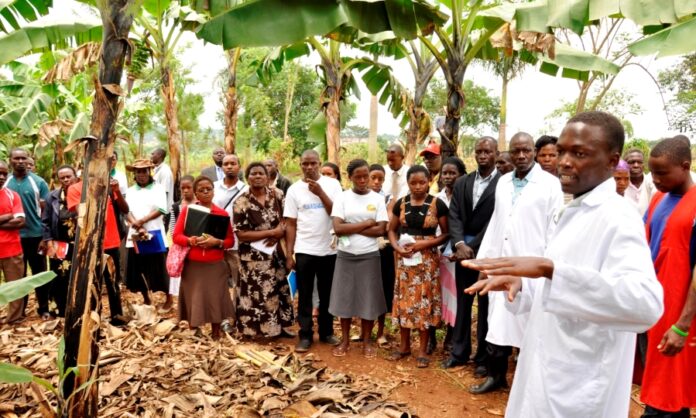Two prominent universities, Kenya’s Egerton University and Uganda’s Makerere University, are spearheading efforts to bolster agricultural productivity and resilience through sustainable, climate-smart agricultural practices aimed at improving food and nutrition security in East Africa. This initiative is crucial as the region grapples with increasing food insecurity driven by climate change.
Establishing Centers of Food Security and the Environment
Egerton and Makerere Universities are aligning with global trends by establishing institutes dedicated to food security and environmental studies. These centers are pivotal in helping governments identify and address challenges related to food security.
“These centers, integrated within our faculties, directorates, and institutes, are expected to propose solutions to the complex issues surrounding food systems and the growing challenge of feeding a rapidly increasing population,” stated Professor Isaac Ongubo Kibwage, Vice-Chancellor of Egerton University.
Launching the Centre of Excellence in Regenerative Agriculture
The universities are key players in the Reduce, Reuse, Recycle Rice Initiative for Climate Smart Agriculture (R4iCSA) project. This initiative, driven by Kilimo Trust, a non-profit organization focused on sustainable agricultural development, aims to promote science-based, market-driven agricultural practices in East Africa. Kilimo Trust is also establishing a Centre of Excellence in Regenerative Agriculture at Egerton University, as announced by Anthony Mugambi, Kilimo Trust Kenya team leader, during the Africa Fertilizer and Soil Health Summit organized by the African Union in Nairobi.
R4iCSA Project Phases and Goals
The R4iCSA project commenced with a pilot phase in 2020 and entered its second phase in October 2022. Funded by the IKEA Foundation, this five-year, $5 million project initially benefited 5,000 smallholder farmers in Kenya and Uganda and now aims to reach 10,000 households.
Egerton University’s Agro-Sciences Park Seed Unit hosts the Kilimo Trust’s Kenya office. Established as part of Kenya’s Vision 2030 development program, this unit is instrumental in transferring technology from the lab to the market, supporting economic growth through innovative agricultural practices.
Strategic Activities and Research Focus
The Agro Sciences Park Seed Unit’s strategic activities include:
- Providing infrastructure for incubating agro-innovations.
- Facilitating partnerships in agro-value chain development.
- Managing knowledge and technology transfer between universities, the private sector, and entrepreneurs.
The unit, led by Professor Paul Kimurto, a specialist in dryland research and drought stress physiology, has successfully introduced high-yielding upland rice varieties in Kenya and Uganda. This marks the first-time upland rice is being cultivated in semi-arid regions, showcasing significant potential for enhancing food security.
Multi-Partner Collaboration and EAC Support
Recognizing the critical role of agricultural faculties in addressing food security, the East African Community (EAC) supports research initiatives aimed at building resilience and increasing agricultural productivity. The R4iCSA project involves collaboration among EAC governments, universities, the private sector, and research institutions such as KALRO (Kenya Agriculture and Livestock Research Organization), NARO (National Agricultural Research Organization), and NACRRI (National Crops Resources Research Institute).
Makerere University works closely with the Buginyanya Zonal Agricultural Research and Development Institute (BugiZARDI) under NARO’s guidance. BugiZARDI focuses on protocols involving biochar, vermicast, and rice-legume integration to improve rice production and soil health.
Generating Evidence for Sustainable Practices
The second phase of the R4iCSA project aims to generate robust evidence on the economic benefits of sustainable and regenerative agricultural practices. This evidence will support stakeholder engagement and policy development to promote regenerative agriculture in the rice sub-sector.
Expected outcomes of R4iCSA II include:
- Increased adoption of sustainable rice production practices.
- Enhanced awareness of wetland conservation.
- Greater integration of legumes with rice farming.
- Improved access to markets for rice and its by-products.
- Influencing policy shifts through evidence-based knowledge products.
Addressing Climate Challenges
With climate change disproportionately affecting Africa, targeted government support for research and development in agriculture is vital. The EAC’s new strategy to improve rice production aims to reduce import dependence and boost intra-regional trade. This strategy, supported by the Coalition for African Rice Development, was adopted in May 2023 to consolidate efforts in the rice sub-sector.
Egerton and Makerere Universities, through their innovative research and strategic partnerships, are playing a crucial role in addressing the pressing issues of food security and agricultural sustainability in East Africa.
















 The African Research (AR) Index is a comprehensive scholarly directory and database focused explicitly on journal publishers that publish and disseminate African research.
The African Research (AR) Index is a comprehensive scholarly directory and database focused explicitly on journal publishers that publish and disseminate African research.

